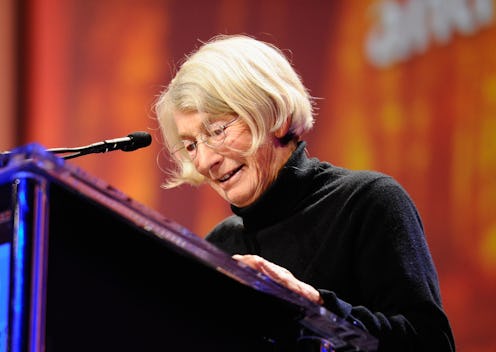Books
Beloved Pultizer Prize-Winning Poet Mary Oliver Has Died At Age 83

Pulitzer Prize and National Book Award-winning poet Mary Oliver has died at the age of 83. According to an article on the San Francisco Chronicle's website, Bill Reichblum, Oliver's literary executor, says she died Thursday, Jan. 17 at her home in Hobe Sound, Florida. The cause of death was lymphoma.
Oliver was the author of more than 15 poetry and essay collections, and was well-known for her love of the outdoors and animals, along with her joyous takes on life and the world. Her work is said to have a signature simplicity, and Oliver believed that "Poetry, to be understood, must be clear." According to NPR, Oliver once said in an interview, "It mustn't be fancy. I have the feeling that a lot of poets writing now, they sort of tap dance through it. I always feel that whatever isn't necessary should not be in the poem."
Oliver was born in Maple Heights, Ohio on Sept. 10, 1935. Her childhood was marred by a sexually abusive father and a neglectful mother, and Oliver turned to both poetry and nature as refuge. As a young poet, Oliver was said to be deeply inspired by fellow poet Edna St. Vincent Millay, and as a teen Oliver briefly lived in Millay's home, where she helped the poet's family sort through the papers she left behind after her death in 1950. In the mid-1950's Oliver attended both Ohio State University and Vassar College, though she never received a degree.
Her first collection of poems, No Voyage, and Other Poems, was published in 1963, the beginning of a prolific career that would see her work honored with a Pulitzer Prize, a National Book Award, an American Academy of Arts & Letters Award, a Lannan Literary Award, the Poetry Society of America’s Shelley Memorial Prize and Alice Fay di Castagnola Award, along with fellowships from the Guggenheim Foundation and the National Endowment for the Arts, among others. Oliver also held the Catharine Osgood Foster Chair for Distinguished Teaching at Bennington College until 2001.
In her 2006 poem, "When Death Comes," Oliver writes:
When it's over, I want to say all my life I was a bride married to amazement. I was the bridegroom, taking the world into my arms.
When it's over, I don't want to wonder if I have made of my life something particular, and real.
I don't want to find myself sighing and frightened, or full of argument.
I don't want to end up simply having visited this world.
And in this, one thing is certain: the work of Oliver's "one wild and precious life" will no doubt have an impact on readers and writers for generations to come.